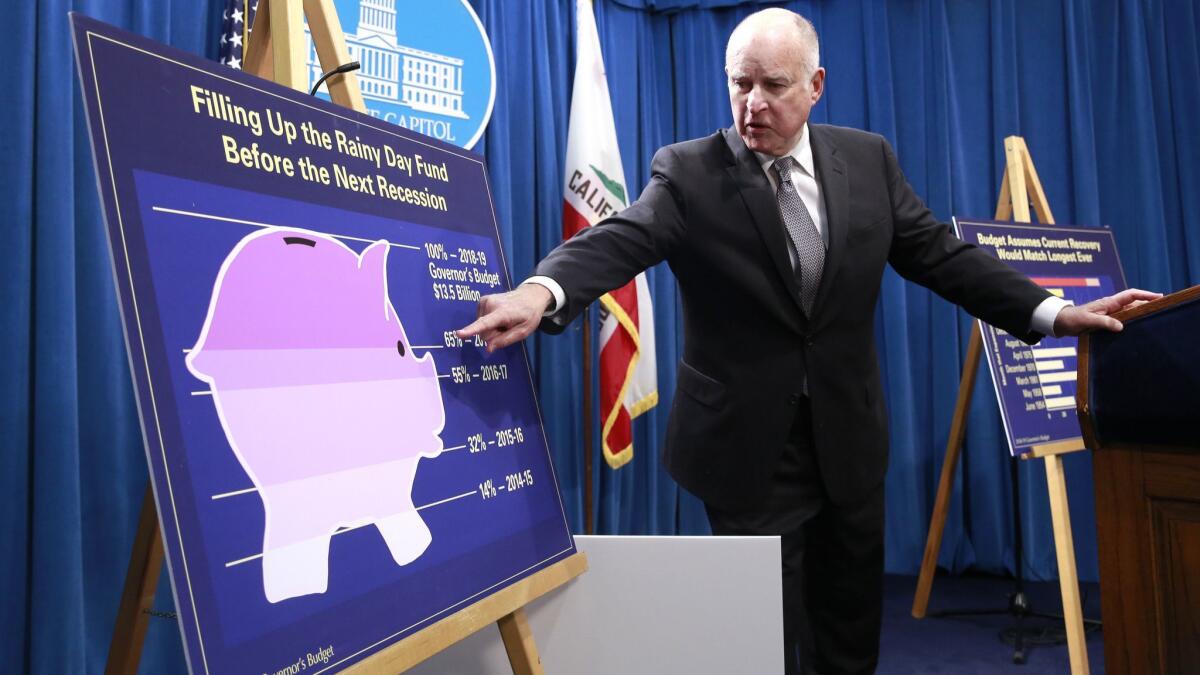Column: Stashing cash for a rainy day isn’t as easy as it sounds for California government

- Share via
Reporting from Sacramento — Few ballot measures have ever been more resoundingly embraced by Californians than Proposition 2, the 2014 constitutional amendment championed by Gov. Jerry Brown requiring that more state tax money be put aside for rough economic times.
But there’s some surprising analysis now being shared inside the state Capitol: The proposition that won 69% of the vote could have the surprising effect of limiting how much cash gets stockpiled for easing the budget cutbacks inevitable in the next recession.
In short, it’s about trust. If only voters believed the California Legislature would do the right thing, they would give lawmakers more flexibility in governing the state and would impose fewer rules through the ballot box.
Proposition 2 was just such a rule, a governing “two-fer” that increased the size of the state budget’s rainy-day reserve fund while also creating a new mandate for paying off government debt. “Proposition 2 sets aside money to prepare us for economic storms,” Brown said in a TV ad during the 2014 campaign.
Column: Here’s why so many Democrats are lining up to oppose Prop. 70 »
It also sets a firm cap on how much cash can be held in reserve — no more than 10% of California’s general fund tax collections. At that point, Proposition 2 sends earmarked cash not to a savings account but to infrastructure projects. That spending certainly has benefits, but it’s the kind of mandate that hinders flexibility in responding to the specifics of a crisis.
And this spring, those rules matter. Brown has proposed using $3.5 billion in surplus tax revenue to top off the rainy-day reserve fund ahead of schedule. If lawmakers sign off on his plan, the mandatory infrastructure payments will begin next year and would probably continue into the foreseeable future, even if the economy slows and budget deficits return.
A report almost two weeks ago by the nonpartisan Legislative Analyst’s Office predicted Brown’s eagerness to overpay into the rainy-day fund could trigger almost $2.9 billion of infrastructure spending over the first three years. In previous crisis times, that’s the kind of money that would go toward shielding services such as child care or higher education.
The growing fear in Sacramento of an economic downturn in the near future makes this a discussion worth having. Given the fine print of Proposition 2, there’s only one shot at deciding what to do with the $3.5 billion in extra tax revenues.
The analysts’ report suggests that the Legislature consider rejecting Brown’s proposal, and instead place the surplus cash in a different, more flexible reserve account while making only the required payment to the Proposition 2 fund. That way, the thinking goes, lawmakers could possibly end up with $1 billion more in emergency cash in the event of a budget deficit.
None of the existing options would fully fill the hole that even a modest recession would create. “That said,” write the analysts, “these reserves would still buy the Legislature considerable time as it made other choices to confront such a budgetary challenge.”
To do this, though, legislative leaders will have to confront Brown and challenge his reputation for being the most frugal, prudent Democrat in Sacramento. They’ve privately grumbled in recent years about how little credit has been given to the Legislature. Objecting to the governor’s plan for this year’s cash surplus could provide lawmakers the chance to prove that he’s not the only politician who’s eager to plan for the worst.
Follow @johnmyers on Twitter, sign up for our daily Essential Politics newsletter and listen to the weekly California Politics Podcast
ALSO:
Updates on California politics
More to Read
Get the L.A. Times Politics newsletter
Deeply reported insights into legislation, politics and policy from Sacramento, Washington and beyond. In your inbox twice per week.
You may occasionally receive promotional content from the Los Angeles Times.











